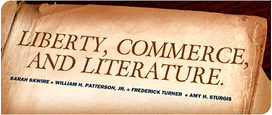Frederick Turner writes, “The challenge is to recover a robust realm of art and literature that recognizes the deep beauty of human liberty, rationality, and enterprise … ” Hear, hear.
And of course, we tend to forget that art and literature that is not, as Ayn Rand had it, “anti-life” was around all through the dark days of the twentieth century, even during the dominance of academic forms such as abstract expressionism in painting and serial and aleatory music — and did not have to be ideology-top-heavy. The non-verbal arts may be leading the way, as I note that the so-called “neo-Romantic” movement in painting and in serious music are producing some intriguing work (though I don’t think there is anything like a transcendent work of genius to come out of it yet (but, again, it’s early days…) (I can’t quite see Morten Lauridsen’s “Lux Aeterna” in that role, though there’s certainly an unseemly amount of gushing about it in some circles).
In literature, we’re not going to get a literature of human aspiration again until we get artists who feel it again — and feel it overridingly. At the moment there is no real market for that sort of thing — and no such market is likely to emerge until what is loosely called the “New York Publishing Mafia” breaks up and is buried so far under that not even its zombified corpse can unearth itself. There are hopeful movements in that direction, but the sad fact is that the fifty to seventy year old conventions of the ironic novel are set in concrete.
“What you Yanks lack,” an elderly English science fiction writer told us once, “is a decent sense of despair.” Well, that remark gave me a sense of despair, all right: This eminent practitioner did not seem to realize that he was doing nothing more than privileging one set of literary conventions over others—and that, as literary conventions, none is better than others; you can get good art out of the romance as readily as out of the ironic novel. Science fiction did hold out for a very long time indeed, and that is a matter for hope, surely: it’s a commonplace of literary history that the prestige forms of one era come out of the subliterary forms of earlier eras. We can look back on Wordsworth’s theoretical preface(s) to Lyrical Ballads and see that his “real language of men” owed more to broadsides and street songs than to any such naturalistic speech. Indeed, I would like to find a collier anywhere who wanders lonely as a cloud among the daffodils. Literary progressives always take up the same tattered banner of naturalism, no matter how unnatural the conventions they want to work in may be.
And that suggests that for us to get that literature of hope, people have to see that hopefulness as naturalistic. Fortunately, what is seen as naturalistic is in the eye and ear of the beholder; if we had to wait for it to become actually natural, we’d be outlining our hands on cave walls still.

